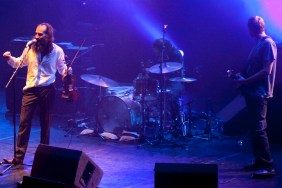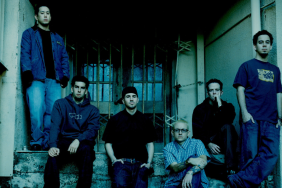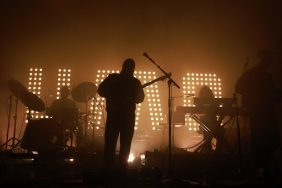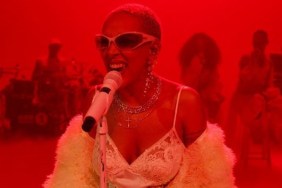Melding a meandering atmospheric folk sound with pop sensibilities, peppering it all with rich instrumental textures including violin and bassoon, friendly Novocastrians Post Paint music is as warm as it is haunting. While starting life as a folk singer/songwriter duo named New Caledonian Blue, the band’s ranks have swelled and so has their sound.
Going from a two-piece to a five-piece, the new members adding bass, keys, drums, bassoon and trumpet to the band’s guitar, violin and vocals, Post Paint have left their delicate folk songs behind in favour of a more all-encompassing and atmospheric sound. At times wistful, at others direct, the band aren’t afraid of experimenting with their sound, eager to explore the possibilities of their relatively infant musical identity.
Being the friendly people that they are, guitarist/vocalist Bligh Twyford-Moore and violinist/vocalist Ailsa Fulcher made some time for us degenerates here at Music Feeds ahead of their upcoming show at MUM this Friday.
Music Feeds: You guys use a wide range of instrumentation that you don’t usually see outside of a classical ensemble; do some of you have roots in classical training or are you all self taught?
Bligh Twyford-Moore: Post Paint is a real mix of self taught garage musicians, multi-instrumentalists and classically trained players. While our bassoonist studies at Sydney Con, our drummer sings for a Newcastle punk band. I think these varied approaches to music were something that really appealed to us from the start, listening to bands like the Dirty Three, The National and Arcade Fire.
MF: Using such a rich base of textures, does the songwriting include a lot of planning out harmonies etc or is there still a lot of jamming with each other?
Ailsa Fulcher: Our song writing is probably best described as diplomatic; we try to kind of throw ideas around but not to prescribe just one way a song will sound. Usually each member will write their own part and we have a kind of unspoken rule not to tell each other what to do too much beyond friendly suggestions. Also, accommodating everyone’s various commitments and projects means there has to be a fluidity in the songs as we can be playing shows from anywhere between two and six people.
BTM: Some older songs were written by just borrowing songs that I’d originally written for guitar and voice and trying to simplify their elaborate structures of incongruent guitar parts that, while working well in solo performances where there was room for rubato and fuckups, left little room for other textures. Whereas now we try to write more for the band rather than a specific instrument, so people can’t pinpoint what each instrument is doing at all times, and the roles and melodic focus kind of moves around.
MF: Before there was Post Paint there was New Caledonian Blue; how did the change come about?
BTM: We’re really stoked that the project has come so far from the days of NCB, where Ailsa and I got together to play some songs to our friends at small venues in Newcastle. As time went by and the band grew, that name felt very specific. NCB was actually taken from a trip I took to New Caledonia, whereupon discovering in the Noumea Cultural Heritage Museum (basically a weatherboard shack) a cheesy surf record called ‘New Caledonian Blue’, I decided to adopt the name. It’s crooning French obviously alluded to the idyllic blue of surf, but that seemed to be a perfect picture of my broody homesickness, my own New Caledonian blue.
And so we split from the name, opting for ‘Post Paint’, originally inspired by the track by Stephen Malkmus ‘Post Paint Boy’, which basically talks about art as bullshit. We thought maybe by taking that name we could lead by negative example and try to make something pure, or failing that, at least slightly distinct in a music/art scene that, according to Malkmus, is so saturated with ‘coked-up quasi-urbane kids’.
MF: You embrace a lot of textures and influences from outside the typical pop spectrum but at the same time you mention that you try to keep it all bundled up in the parameters of simple pop songs. How do you do that, and is it ever a challenge to take a particularly out there idea and refract it back through a pop sensibility?
AF: Coming from a classical background I’ve always been really drawn towards pop musicians who are able to synthesise complex classical or jazz ideas with more of a pop ideal. People like Joanna Newsom, Belle & Sebastian, Warren Ellis and Nick Drake have been really influential in the way I write my parts I think. In a lot of our songs we kind of move away from the typical pop song structure and harmony, often without actually meaning to. We never stray that far though, I don’t think.
BTM: Yeah I think that the aspiration of containing these disparate elements in the guise of a pop song is just that, an aspiration. But looking at literary pop bands like the Go-Betweens, you can see that it is possible for songs to be at once about all this stuff that you want to write down, and then at the same time on a different level, just something you can dance to or listen to while working in the yard. I think that’s kind of what we’re trying to do.
MF: You’re going in to record in September; is this your first time working in a studio? Where are you doing it and do you have any plans about how you’re going to approach the recording?
AF: Yeah, we are very excited to get some good recordings down. We’re all pretty stereotypical students in that we are always strapped for cash, so we’ve been trying to earn some money busking around the streets of Newcastle. We were busking when we actually met Adam of Empire Audio Labs who’ll be recording us. At first we thought he was just some cheap-skate dropping a business card in our case instead of coins, but he contacted us online later that day and seemed super keen to help out. He’s just kind of getting started but his set-up is awesome (not to mention he’s cutting us a pretty sweet deal). Our plans for the recordings are grand as always. We’re shooting for a 5 track EP, but the more songs we can get down the better.
MF: What makes a good recording (as opposed to a good song) in your mind? Is it important to you for a recording to capture the live sound or do you see the two disciplines as essentially divergent?
AF: Tough question. I think a good song can still usually speak for itself, no matter how bad the recording. But a bad song recorded well is still going to be a bad song no matter what bells and whistles you put on it. Saying that, of course you can’t dismiss the importance of a good recording. Recordings are usually how a listener engages with a band’s music; it’s what they’re left with after the show, after the TV spot, whatever. I think it’s important for a band to treat the mediums differently but still retain a strong correlation between the two. I know the feeling of falling in love with a band, and then realising their music is totally different live. But I also know the disappointment felt when bands just play note for note, letter for letter what they’ve done in the studio.
Hopefully we can bring something a bit new to the table when we go in to record, maybe with some extra orchestral instruments if we can convince some of our talented friends and siblings to help out. Up until now we have very much just been a live band so hopefully that transition is going to work okay.
MF: With the EP, will that be a rerecording of the songs you have on the MySpace or are you guys going to be working with new material?
BTM: The stuff we have on MySpace presently was all done in the summer, very much in the vein of the old NCB days. We’re reworking a couple of songs that are up there now, but we’ve also got three new tracks that we’re pretty excited to put down.
MF: Other than the EP round the end of the year is there anything else we should be keeping an eye out for?
B & A: Santa.
Post Paint play Mum @ Worldbar this Friday September 3rd













